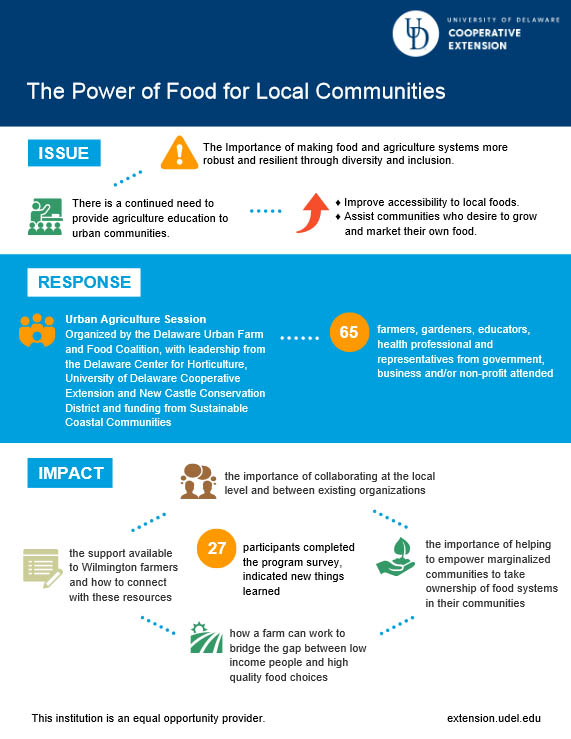
The Power of Food for Local Communities (2018)
- Health & Well-being
-
Agricultural Programs
- Agribusiness
- Animal Science
- Beginning Farmer Program
- Commercial Crops
- Commericial Horticulture
- Delaware Soil Testing Program
- Disease Management
- Farm Vitality and Health Project
- Irrigation
- Nutrient Management
-
Insect Pest Management
- Insect Trapping Program
- IPM Hot Topics
- Commercial Field Crop Insect Management
- Commercial Field Crop Disease Management
- Commercial Fruit & Vegetable Crop Pest Management
- EIPM Implementation Projects
- Pollinators
- Research and Extension Demonstration Results
- Brown Marmorated Stink Bug (BMSB) Management, Research, and Resources
- Publications
- Pesticide Safety Education Program
- UD Plant Diagnostic Clinic
- Variety Trials
- Weed Science
- Certified Crop Advisor Program
- Poultry Biosecurity
- 4-H
-
Horticulture
- Climate Variability and Change
- Delaware Soil Testing Program
- Forestry
- Lawn and Garden
- Master Gardeners
- Master Naturalist Program
-
Nutrient Management
- Nutrient Management Certification
- Continuing Education for Nutrient Management
- Nutrient Management Planning Resources
- Commercial Nutrient Handler Resources
- Poultry Litter and Manure Management
- Turf Management
- Agriculture Notebook
- Horticulture Handbook
- Agriculture & Horticulture Handbooks
- Crop Production
- Soil Fertility
- Delaware Climate Change Coordination Initiative (DECCCI)
- Salt Impacted Agricultural Lands

ISSUE
Childhood obesity and its health impacts are well known. The national childhood obesity rate is 18.5% with one-third of children being overweight or obese. The rates vary among age groups, but rise as children get older. Teens who are obese have a 70 to 80% chance of becoming obese adults. In addition, significant environmental changes have decreased physical activity and increased food intake. These changes include increased amounts of screen time, less outside play, less physical education in school, increased food portion sizes, fast food, and food used as rewards. Since it is much easier to start with healthy habits at a young age than try to change as an adult, establishing healthy habits among youth is very important.
RESPONSE
The Delaware Urban Farm and Food Coalition (DEUFFC) led by the Delaware Center for Horticulture (DCH), University of Delaware Cooperative Extension (UDCE) and New Castle Conservation District (NCCD) organized the urban agriculture session. After networking and refreshments prepared by the Delaware Local Food Exchange, Karen Washington, Famer/Owner of Rise and Root Farm, provided inspiration and professional development. The session reached 65 farmers, gardeners, educators, health professionals and representatives from government, business and/or non-profits.
IMPACT
Of the 27 participants who completed the program survey, an overwhelming majority were residents of New Castle County, Delaware, with a few from neighboring, Pennsylvania, and almost half attending Delaware Agriculture Week for the first time. A summary of the surveys revealed participants most appreciated the speaker, networking and good food, gathering information, connecting with community resources, and better understanding local urban agriculture projects and how to get involved. New things learned included:
- The importance of collaborating at the local level and between existing organizations
- The support available to Wilmington farmers and how to connect with these resources
- How a farm can work to bridge the gap between low income people and high quality food choices
- The breadth of programs and initiatives in urban agriculture
- The importance of creating intersectional and collaborative movements in order to empower marginalized communities to take ownership of food systems in their communities
Thank you to the Sustainable Coastal Communities Initiative who provided funding for this session.
The University of Delaware is an Equal Opportunity Institution and Provider. Visit UD’s Office of Equity & Inclusion to learn more.
Additional Links
531 South College Avenue Newark, DE 19716 (302) 831-2501
